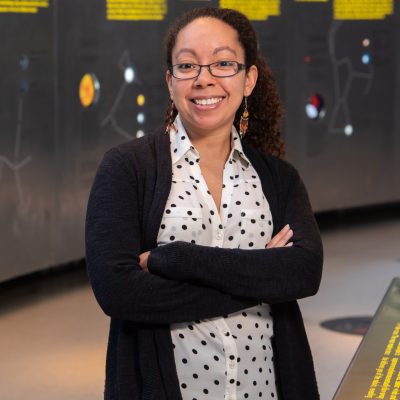Postdoc Spotlight: Eileen Gonzales

September 19, 2022
Eileen Gonzales is a postdoc in astronomy from Virginia Beach, Virginia. She holds a Ph.D. from the City University of New York Graduate Center, and her research at Cornell focuses on brown dwarfs and the atmospheres of giant planets beyond our solar system. She is a recipient of a Postdoc Achievement Award for Excellence in Leadership as part of Cornell’s celebration of National Postdoc Appreciation Week 2022.
What is your area of research, scholarship, or work and why is it important?
I study the atmospheres of giant planets beyond our solar system and brown dwarfs. Brown dwarfs are objects which are about the same size as Jupiter but heavier and hotter. They lie beyond our solar system and are much easier to directly study compared to giant exoplanets as we can observe the light from them directly. I examine their atmospheres using a computational method, called atmospheric retrievals. This method helps me to start from the observed data and back out the chemical composition, clouds, and atmospheric pressure-temperature structure of the brown dwarf. The retrievals results also can help us learn how these objects may have formed.
What are the broader implications of this research, scholarship, or work?
My work helps us understand how planets and planet-like objects form. By better understanding this we can compare our solar system to other exoplanetary systems. Additionally, my work is helping to move forward the development of the tools we need to examine the atmospheres of Earth-like planets in the future.
What does receiving a Postdoc Achievement Award mean to you?
I am really grateful to receive the Postdoc Achievement Award for Excellence in Leadership. It means so much to me to see that people outside of my field value the work I have done with Black In Physics. Black In Physics is a non-profit organization that centers the needs of Black individuals by developing community-based support structures to champion Black physicists along their journeys. Black In Physics is dedicated to celebrating Black physicists, their contributions to the scientific community, and revealing a more complete picture of what a physicist looks like. I am so happy to see what has come from this organization and how it has impacted so many in physics and related fields.
What hobbies or activities do you enjoy in your spare time?
I enjoy swing dancing, crocheting, and growing a large number of house plants and veggies in the garden. I also enjoy hiking and playing weekly Mariokart with friends.
Why did you choose Cornell?
I chose Cornell because I would get to work with an incredible mentor, Nikole Lewis. Nikole has been such a wonderful mentor to me with research and so much more. I also get to work with an amazing group of people in the Substellar Explorers research group, who are all working on different aspects of exoplanet science.
What is next for you?
Next for me is applying for faculty jobs! Research-wise, I’m looking forward to getting data from JWST on many brown dwarfs and exoplanets!
Do you have any advice for current graduate students?
You need a community. You need more than yourself to survive grad school. It’s so important to find mentors that can help you with research and ones that can help you with making the transition to your next position. Also, you need a community outside of grad school, one that you can go to for relaxation and support outside of academia.
